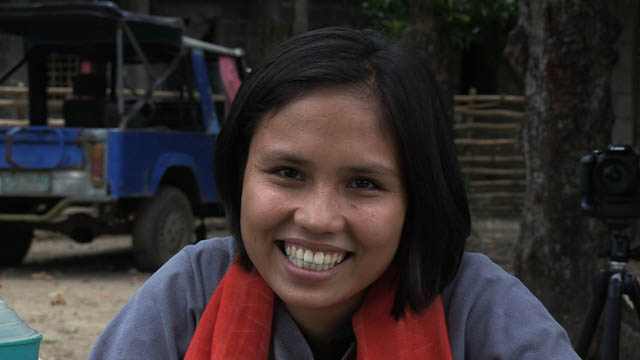SUMMARY
This is AI generated summarization, which may have errors. For context, always refer to the full article.

ISABELA, Philippines – “They attempted to assassinate me on February 28,” narrated Antero of Maria Cecilia Farmworkers Association (Macfawa) in Isabela, a town in Negros Occidental province.
“It was 6:30 PM,” said Antero. “There were two motorcycles, one with 3 people and the other with one passenger.”
The gun misfired, and Antero’s life was spared. He was luckier than his brother, Victoriano Embang, former president of Macfawa. Embang was killed on December 29, 2012 just meters from the farming community.
“Our suspicion was that the killing had to do with the land,” said Cherry Pie, Antero’s 17 year old niece and daughter of the slain Embang.
Macfawa had become embroiled in land reform turned violent.
Land reform
The workers of the 92-hectare Hacienda Maria Cecilia had been organized since the 1990’s. They won various labor cases against the former owners, the Montilla sisters, scion of the famous Montilla clan who originally owned almost all of the land in Central Negros.
The workers attacked a variety of issues, such as wage differential and workers benefits through dialogues, confrontation, work stoppage, and picket, and attained most of their demands.
When the Montilla Sisters leased their land to another big landlord, Antonio Trebo, goons were used to intimidate the workers, said Cherry Pie. The union filed other labor cases and won.
Cloa and ‘leaseback’
Cherry Pie was only 14 when her father, then the president of Macfawa, successfully implemented Comprehensive Agrarian Reform Program (CARP) under a Certificate of Land Ownership Award or Cloa. The Cloa was only a temporary title, however, as the land still had to be amortized for 25 years.
The petition was filed in 2004 but Cloa was awarded only in 2009. Cherry Pie said Macfawa attributed the delays in the processing of the petition to the conspiracy of the Montillas, Trebol, Register of Deeds (for title processing) and the regional Department of Agrarian Reform office.
(Rappler tried to reach these individuals and entities for comment but they did not reply.)
“If they are individual, the Department of Agrarian Reform (DAR) process to get the Cloa is slow,” said Cherry Pie. “But if they are organized in an organization, the organization pushes DAR to get the Cloa faster.”
Some community members and Cloa recipients opted to lease back their portion of the hacienda to Trebol, she explained.
“The ‘leaseback’ is like giving your land back. But it would be returned to the boss,” said Cherry Pie. “The boss of the hacienda would pay P15,000 a year, but your profit [if you did not lease it back would have been] P60,000.
Collective ownership
Since they were installed as Cloa holders in 2010, the farmworkers collectively controlled and managed the remaining 27 hectares of land through their association.
In the first year, the association procured a production loan based on a surplus of income. They were soon able to procure a low-interest loan from a pro-cooperative institution.
“You can see the improvements of the organization because they bought more farm equipment…like a tractor, a tiller, and a water pump,” said Cherry Pie.
After two years, the economic condition of Macfawa members had greatly improved. Migration had lessened, hunger minimized, and they were able to send their kids to high school and some to college.
Murder
The collectively owned lands were prime irrigated and fertile, thanks to its location at the foothills of Mt. Kanloan volcano. Nearby landlords continued to ask that the lands be leased back to them, but the association refused.
Since last year, Cherry Pie’s father and Macfawa leader Victoriano received threats from armed goons frequenting the property. They were demanding that the association share some portion of the land or re-divide the land to those Carp recipients who opted for leaseback.
On December 29, 2012, Embang was ambushed by two men riding in tandem. He was fatally shot on the back and was pronounced dead on arrival at a nearby hospital.
“I’m still asking myself, ‘Why did they kill him?'” wondered Cherry Pie.
“Stronger instead”
With his death, the association and its members resolved to continue their collective production. Cherry Pie’s family filed criminal cases against 6 identified gunmen-for-hire seen in the area before Embang was shot.
On February 28, 2013, the assassination attempt was carried out on Embang’s brother.
“The killer wants to kill Tito [Embang] because my tito knows how to run the organization. So, he is a target for them. If they kill him, no one will stand up for the organization,” Cherry Pie said.
Embang’s murder and the subsequent attempt on his brother Antero’s life did little to deter Macfawa.
“They wanted to disorganize the association,” said Antero. “But the association became stronger instead.” – Rappler.com
Editors’ note: This is part of the series, Workers find ways: Tara, break muna.
Watch and read the other stories in the series:
Workers find ways: The BPO worker
Workers find ways: The domestic helper
Workers find ways: The OJT student
Workers find ways: The factory worker
Workers find ways: The agency worker
Workers find ways: The volunteer nurse
Workers find ways: The factory technician
Workers find ways: The ship builder
Workers Find Ways: The farm worker
Add a comment
How does this make you feel?
There are no comments yet. Add your comment to start the conversation.